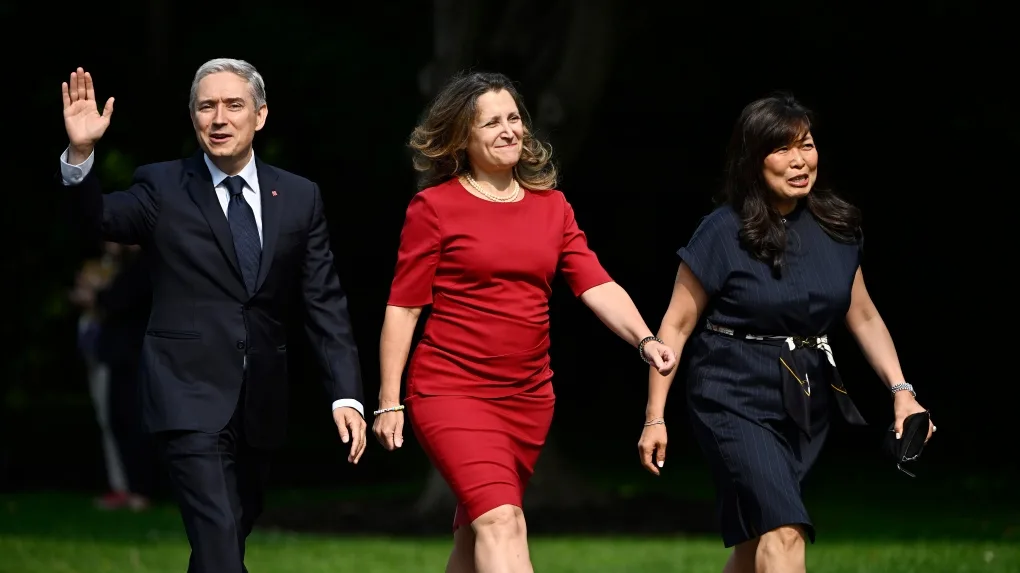Ottawa – Canadian workers, the auto sector, the steel and aluminum industries, and related critical manufacturing supply chains are threatened by unfair competition from Chinese producers, who benefit from China’s intentional, state-directed policy of overcapacity and oversupply, as well as its lack of rigorous labour and environmental standards. That is why the federal government is taking further action to protect Canada’s workers and investments from China’s unfair trade policies.
On August 26, 2024, the federal government announced a 100 per cent surtax on all Chinese-made electric vehicles (EVs), effective October 1, 2024, and its intent to impose a 25 per cent surtax on imports of steel and aluminum products from China under section 53 of the Customs Tariff. On September 10, the government also launched consultations on potential surtaxes to protect critical manufacturing sectors, which remain open for stakeholder comment until October 10, 2024.
Today, the Honourable Chrystia Freeland, Deputy Prime Minister and Minister of Finance, announced the final list of steel and aluminum products from China that will be subject to the 25 per cent surtax, effective October 22, 2024. This will protect workers and businesses in Canada’s steel and aluminum sectors against China’s unfair trade policies and prevent trade diversion resulting from recent actions taken by Canadian trading partners. These surtaxes will not apply to Chinese goods that are in transit to Canada on the day on which they come into force—October 22, 2024.
Recent consultations with Canadian stakeholders confirmed that exceptional measures are required to address the extraordinary threat from Chinese producers. However, the government also heard concerns from certain stakeholders about challenges with adjusting supply chains before the measures enter into force. To ensure Canadian industry has time to adjust supply chains, the government intends to implement a framework to consider requests for tariff relief. Potential factors that may be included in the framework are situations of short supply, requiring additional time to switch to alternate sources of supply, such as certification requirements, and other exceptional circumstances. Further details on the remission order framework, including the application process and eligibility criteria for relief, will be released in advance of that date. Requests for remission or inquiries on the remission process can be directed to remissions-remises@fin.gc.ca.
In addition to today’s progress on steel and aluminum tariffs, the government is confirming the 100 per cent surtax on all Chinese-made EVs imported into Canada now applies to electric vehicles and certain hybrid passenger automobiles, trucks, buses, and delivery vans.
The federal government intends to review these measures within a period of one year from their entry into force. Today’s actions may be extended for a further period of time and supplemented by additional measures, as appropriate.
“We are moving in lock-step with key international partners to protect Canadian workers and businesses in our steel and aluminum sectors from China’s intentional, state-directed policy of overcapacity and oversupply, which is undermining Canada’s ability to compete in domestic and global markets. Canada is taking decisive action to level the playing field and protect Canadian workers and investments in Canadian industry.” – Chrystia Freeland, Deputy Prime Minister and Minister of Finance
“China’s non-market policies and practices create an unfair playing field for businesses and undermine the success of Canadian workers. Our government will always defend our national interest and the best interests of Canadians.” – Mary Ng, Minister of Export Promotion, International Trade and Economic Development
“Canada has proud auto, steel and aluminum sectors, ones that have supported generations of workers, and built communities. As the world moves to reduce pollution and keep our air clean, we have attracted historic investments in building EV manufacturing capacity, and creating good-paying jobs, here in Canada. That is why our government is continuing to take concrete actions, to make sure we continue to strengthen our domestic supply chains and bolster access to critical commodities.” – François-Philippe Champagne, Minister of Innovation, Science and Industry
“Today, we are taking further action to protect Canadian workers from China’s unfair, non-market practices. This action, which represents yet another step in the right direction, will help foster the Canadian clean technology and electric vehicle supply chains—from mining critical minerals to manufacturing batteries and vehicles right here at home. As countries around the world increasingly look for a reliable supplier of these products, Canadian workers and businesses will be front and centre in seizing the economic opportunity this demand presents.” – Jonathan Wilkinson, Minister of Energy and Natural Resources








